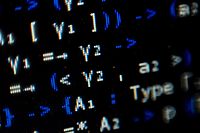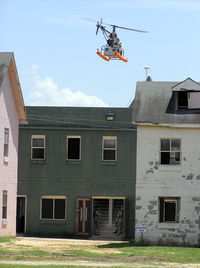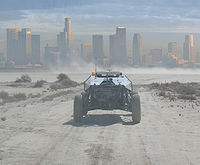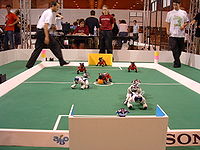- Competitions and prizes in artificial intelligence
-
There are a number of competitions and prizes to promote research in artificial intelligence.
Contents
General machine intelligence
The Machine Intelligence Prize is awarded annually by the British Computer Society for progress towards machine intelligence.[1]
The David E. Rumelhart prize is an annual award for making a "significant contemporary contribution to the theoretical foundations of human cognition". The prize is $100,000.
The Human-Competitive Award[2] is an annual challenge started in 2004 to reward results "competitive with the work of creative and inventive humans". The prize is $10,000. Entries are required to use evolutionary computing.
The IJCAI Award for Research Excellence is a biannual award given at the IJCAI conference to researcher in artificial intelligence as a recognition of excellence of their career.
Conversational behaviour
The Loebner prize is an annual competition to determine the best Turing test competitors. The winner is the computer system that, in the judges' opinions, demonstrates the "most human" conversational behaviour (with learning AI Ultra Hal winning in 2007, Jabberwacky in 2005 and 2006, and A.L.I.C.E. before that), they have an additional prize for a system that in their opinion passes a Turing test. This second prize has not yet been awarded.
Pilotless aircraft
The International Aerial Robotics Competition is a long-running event begun in 1991 to advance the state of the art in fully autonomous air vehicles. This competition is restricted to university teams (although industry and governmental sponsorship of teams is allowed). Key to this event is the creation of flying robots which must complete complex missions without any human intervention. Successful entries are able to interpret their environment and make real-time decisions based only on a high-level mission directive (e.g., "find a particular target inside a building having certain characteristics which is among a group of buildings 3 kilometers from the aerial robot launch point"). In 2000, a $30,000 prize was awarded during the 3rd Mission (search and rescue), and in 2008, $80,000 in prize money was awarded at the conclusion of the 4th Mission (urban reconnaissance).
Driverless cars
The DARPA Grand Challenge is a series of competitions to promote driverless car technology, aimed at a congressional mandate stating that by 2015 one-third of the operational ground combat vehicles of the US Armed Forces should be unmanned.[3] While the first race had no winner, the second awarded a $2 million prize for the autonomous navigation of a hundred mile trail, using GPS, computers and a sophisticated array of sensors. In November 2007, DARPA introduced the DARPA Urban Challenge, a sixty-mile urban area race.
Data-mining and prediction
The Netflix Prize was a competition for the best collaborative filtering algorithm that predicts user ratings for films, based on previous ratings. The competition was held by Netflix, an online DVD-rental service. The prize was $1,000,000.
The Pittsburgh Brain Activity Interpretation Competition[4] will reward analysis of fMRI data "to predict what individuals perceive and how they act and feel in a novel Virtual Reality world involving searching for and collecting objects, interpreting changing instructions, and avoiding a threatening dog." The prize in 2007 was $22,000.
The Face Recognition Grand Challenge (May 2004 to March 2006) aimed to promote and advance face recognition technology.[5]
The American Meteorological Society's artificial intelligence competition involves learning a classifier to characterise precipitation based on meteorological analyses of environmental conditions and polarimetric radar data.[6]
Robot soccer
The RoboCup and FIRA are annual international robot soccer competitions. The International RoboCup Federation challenge is by 2050 "a team of fully autonomous humanoid robot soccer players shall win the soccer game, comply with the official rule of the FIFA, against the winner of the most recent World Cup."[7]
Logic, reasoning and knowledge representation
 Excerpt of a proof in agda2
Excerpt of a proof in agda2
The Herbrand Award is a prize given by CADE Inc. to honour persons or groups for important contributions to the field of automated deduction. The prize is $1000.
The SUMO prize is an annual prize for the best open source ontology extension of the Suggested Upper Merged Ontology (SUMO), a formal theory of terms and logical definitions describing the world.[8] The prize is $3000.
The Hutter Prize for Lossless Compression of Human Knowledge is a cash prize which rewards compression improvements on a specific 100 MB English text file. The prize awards 500 euros for each one percent improvement. The organizers believe that text compression and AI are equivalent problems.
The Cyc TPTP Challenge is a competition to develop reasoning methods for the Cyc comprehensive ontology and database of everyday common sense knowledge.[9] The prize is 100 euros for "each winner of two related challenges".[10]
The Eternity II challenge was a constraint satisfaction problem very similar to the Tetravex game. The objective is to lay 256 tiles on a 16x16 grid while satisfying a number of constraints. The problem is known to be NP-complete.[11] The prize was US$ 2,000,000.[12] The competition ended in December 2010.
Games
The AAAI General Game Playing Competition is a competition to develop programs that are effective at general game playing.[13][14] Given a definition of a game, the program must play it effectively without human intervention. Since the game is not known in advance the competitors cannot especially adapt their programs to a particular scenario. The prize in 2006 and 2007 was $10,000.
The 2007 Ultimate Computer Chess Challenge was a competition organised by World Chess Federation that pitted Deep Fritz against Deep Junior. The prize was $100,000.
The annual Arimaa challenge offers a $10,000 prize until the year 2020 to develop a program that plays the board game Arimaa and defeats a group of selected human opponents.
2K Australia is offering a prize worth AU$10,000 to develop a game-playing bot that plays a first-person shooter. The aim is to convince a panel of judges that it is actually a human player.[15]
The Google AI Challenge[16] is an bi-annual online contest organized by the University of Waterloo Computer Science Club and sponsored by Google. Each year a game is chosen and contestants submit specialized automated bots to play against other competing bots.
References
- ^ Machine Intelligence Prize
- ^ The Human-Competitive Awards
- ^ Congressional Mandate DARPA
- ^ The Experience Based Cognition Project
- ^ NIST Face Recognition Grand Challenge
- ^ http://www.nssl.noaa.gov/ai2008/
- ^ The RoboCup2003 Presents: Humanoid Robots playing Soccer PRESS RELEASE: 2 June 2003
- ^ The Annual SUMO Prize
- ^ http://www.opencyc.org/doc/tptp_challenge_problem_set
- ^ http://www.opencyc.org/announce/Cyc%20ATP%20Challenges%20at%20CASC-J4
- ^ doi:10.1016/j.ipl.2006.04.010
- ^ http://uk.eternityii.com/competition-rules-eternity-2/
- ^ General Game Playing
- ^ AAAI-07 General Game Playing Competition
- ^ http://www.botprize.org/
- ^ http://ai-contest.com/index.php
Robot Soccer Competitions Competitions See also: Soccer robots · Competitions and prizes in artificial intelligence Robotics (outline) Main articles Outline of robotics · Glossary of robotics · Index of robotics articles · History of robots · Robotics worldwide · Robot Hall of Fame · Roboethics · Robotic laws · Human-robot interaction · AI Competitions · Future of roboticsRobots Humanoids · Androids · Biomorphic · Hexapods · Industrial · Articulated · Domestic · Entertainment · Military · Medical · Service · Disability · Agricultural · Food service · BEAM robotics · Microbotics · Nanorobotics • List of robots · Fictional robotsRobot classification Robot locomotion Wheels · Tracks · Walking · Running · Swimming · Climbing · Hopping · Metachronal motion · Crawling · BrachiatingRobot navigation Robot research Roboticist · Areas · Evolutionary · Kits · Simulator · Suite · Open-source · Software · Adaptable · Developmental · Paradigms · Ubiquitous Portal ·
Portal ·  Category ·
Category ·  WikiProjectCategories:
WikiProjectCategories:- Artificial intelligence
- Computer science competitions
- Science and engineering awards
- Robotics competitions
Wikimedia Foundation. 2010.



